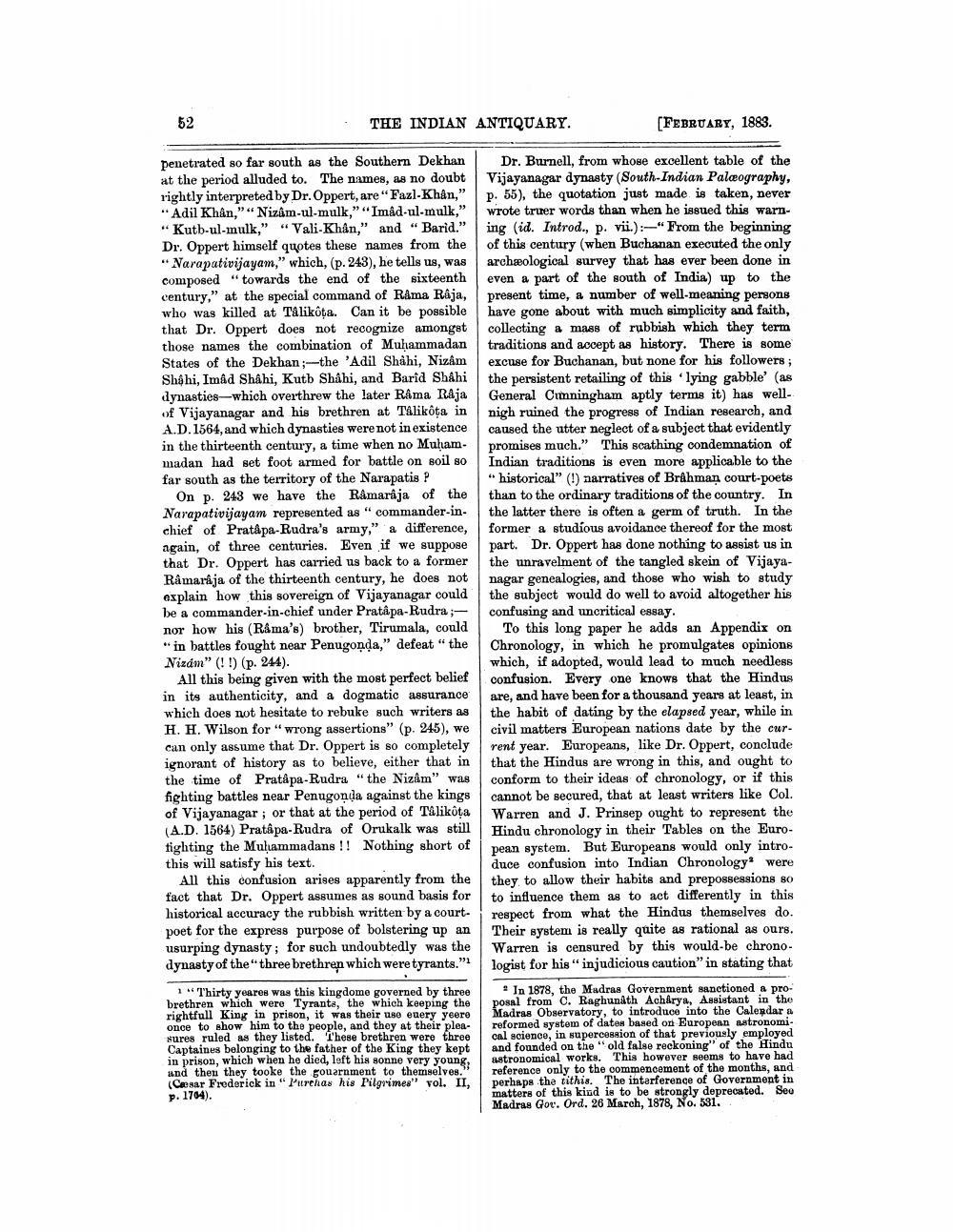________________
THE INDIAN ANTIQUARY.
[FEBRUARY, 1883.
penetrated so far south as the Southern Dekhan at the period alluded to. The names, as no doubt rightly interpreted by Dr. Oppert, are "Fazl-Khan," "Adil Khân," "Nizâm-ul-mulk," "Imád-ul-mulk," "Kutb-ul-mulk," " Vali-Khân," and " Barid." Dr. Oppert himself quotes these names from the "Narapativijayam," which, (p. 243), he tells us, was composed "towards the end of the sixteenth century." at the special command of Rama Raja, who was killed at Talikota. Can it be possible that Dr. Oppert does not recognize amongst those names the combination of Muhammadan States of the Dekhan ;--the 'Adil Shahi, Nizam Shahi, Imad Shahi, Kutb Shahi, and Barid Shahi dynasties-which overthrew the later Rama Raja of Vijayanagar and his brethren at Tilikota in A.D. 1564, and which dynasties were not in existence in the thirteenth century, a time when no Muham. madan had set foot armed for battle on soil so far south as the territory of the Narapatis P
On p. 243 we have the Ramaraja of the Narapativijayam represented as "commander-inchief of Pratápa-Rudra's army," a difference, again, of three centuries. Even if we suppose that Dr. Oppert has carried us back to a former Râmaraja of the thirteenth century, he does not explain how this sovereign of Vijayanagar could be a commander-in-chief under Pratapa-Rudra ;nor how his (R&ma's) brother, Tirumala, could * in battles fought near Penugonda," defeat "the Nizam" (!!) (p. 244).
All this being given with the most perfect belief in its authenticity, and a dogmatic assurance which does not hesitate to rebuke such writers as H. H. Wilson for "wrong assertions" (p. 245), we can only assume that Dr. Oppert is so completely ignorant of history as to believe, either that in the time of Pratápa-Rudra "the Nizam" was fighting battles near Penugonda against the kings of Vijayanagar; or that at the period of Talikota (A.D. 1564) Pratâpa-Rudra of Orukalk was still tighting the Muhammadans !! Nothing short of this will satisfy his text.
All this confusion arises apparently from the fact that Dr. Oppert assumes as sound basis for historical accuracy the rubbish written by a court- poet for the express purpose of bolstering up an usurping dynasty; for such undoubtedly was the dynasty of the three brethren which were tyrants."
Dr. Burnell, from whose excellent table of the Vijayanagar dynasty (South Indian Palæography, p. 55), the quotation just made is taken, never wrote truer words than when he issued this warning (id. Introd., p. vii.) :-"From the beginning of this century (when Buchanan executed the only archæological survey that has ever been done in even a part of the south of India) up to the present time, a number of well-meaning persons have gone about with much simplicity and faith, collecting a mass of rubbish which they term traditions and accept as history. There is some excuse for Buchanan, but none for his followers; the persistent retailing of this lying gabble' (as General Cimningham aptly terms it) has well. nigh ruined the progress of Indian research, and caused the utter neglect of a subject that evidently promises much." This scathing condemnation of Indian traditions is even more applicable to the
historical" (1) narratives of Brahman court-poets than to the ordinary traditions of the country. In the latter there is often a germ of truth. In the former a studious avoidance thereof for the most part. Dr. Oppert has done nothing to assist us in the unravelment of the tangled skein of Vijayanagar genealogies, and those who wish to study the subject would do well to avoid altogether his confusing and uncritical essay.
To this long paper he adds an Appendix on Chronology, in which he promulgates opinions which, if adopted, would lead to much needless confusion. Every one knows that the Hindus are, and have been for a thousand years at least, in the habit of dating by the elapsed year, while in civil matters European nations date by the current year. Europeans, like Dr. Oppert, conclude that the Hindus are wrong in this, and ought to conform to their ideas of chronology, or if this cannot be secured, that at least writers like Col. Warren and J. Prinsep ought to represent the Hindu chronology in their Tables on the European system. But Europeans would only introduce confusion into Indian Chronology were they to allow their habits and prepossessions 80 to influence them as to act differently in this respect from what the Hindus themselves do. Their system is really quite as rational as ours. Warren is censured by this would be chronologist for his" injudicious caution" in stating that
. In 1878, the Madras Government sanctioned a proposal from c. Raghunath Acharya, Assistant in the Madras Observatory, to introduce into the Calendar a reformed system of dates based on European astronomical science, in supercession of that previously employed and founded on the old false reckoning" of the Hindu astronomical works. This however seems to have had reference only to the oommencement of the months, and perhaps the tithis. The interference of Government in matters of this kind is to be strongly deprecated. See Madras Gor. Ord. 26 March, 1878, No. 531.
1 "Thirty years was this kingdome governed by three brethren which were Tyrants, the which keeping the rightfull King in prison, it was their use every yeere once to show him to the people, and they at their pleasures ruled as they listed. These brethren were three Captaines belonging to the father of the King they kept in prison, which when he died, loft his sonne very young, and then they tooke the gouernment to themselves." (Cæsar Frederick in " Parehas his Pilgrimes" vol. II, p. 1704).




